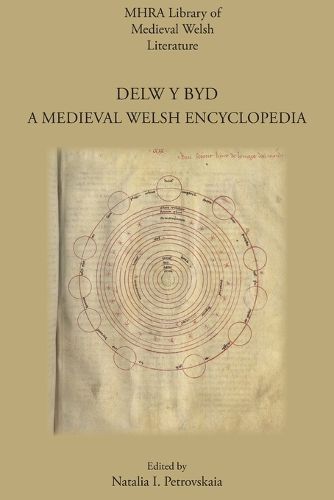Readings Newsletter
Become a Readings Member to make your shopping experience even easier.
Sign in or sign up for free!
You’re not far away from qualifying for FREE standard shipping within Australia
You’ve qualified for FREE standard shipping within Australia
The cart is loading…






This title is printed to order. This book may have been self-published. If so, we cannot guarantee the quality of the content. In the main most books will have gone through the editing process however some may not. We therefore suggest that you be aware of this before ordering this book. If in doubt check either the author or publisher’s details as we are unable to accept any returns unless they are faulty. Please contact us if you have any questions.
This edition presents extracts from the medieval Welsh encyclopedia Delw y Byd. A medieval Welsh translation of the first book of the Latin encyclopedia known as Imago Mundi, written by Honorius Augustodunensis in the first quarter of the twelfth century, this text is a fine example of the ties between the intellectual world of Europe and Wales in the late-twelfth/early-thirteenth centuries, when the text was translated, ties that brought across the scientific knowledge based on Roman and late antique sources. Structured according to the four elements: earth, water, air and fire, the text presents geographical, anthropological, and astronomical information, often with historical and mythological contexts. The present edition follows that organizational principle, providing a glimpse into the medieval understanding of the overarching structure of the universe.
The text is presented in its historical and literary context, with an updated account of its transmission. A commentary on the scientific context of the most interesting passages is provided, as well as a linguistic one. The edition also provides an overview of the variants by printing parallel texts based on all surviving medieval manuscript witnesses for a number of selected chapters. This includes sections of two previously unpublished medieval witnesses of the text. The accompanying glossary includes vocabulary from all extracts included in the edition.
$9.00 standard shipping within Australia
FREE standard shipping within Australia for orders over $100.00
Express & International shipping calculated at checkout
This title is printed to order. This book may have been self-published. If so, we cannot guarantee the quality of the content. In the main most books will have gone through the editing process however some may not. We therefore suggest that you be aware of this before ordering this book. If in doubt check either the author or publisher’s details as we are unable to accept any returns unless they are faulty. Please contact us if you have any questions.
This edition presents extracts from the medieval Welsh encyclopedia Delw y Byd. A medieval Welsh translation of the first book of the Latin encyclopedia known as Imago Mundi, written by Honorius Augustodunensis in the first quarter of the twelfth century, this text is a fine example of the ties between the intellectual world of Europe and Wales in the late-twelfth/early-thirteenth centuries, when the text was translated, ties that brought across the scientific knowledge based on Roman and late antique sources. Structured according to the four elements: earth, water, air and fire, the text presents geographical, anthropological, and astronomical information, often with historical and mythological contexts. The present edition follows that organizational principle, providing a glimpse into the medieval understanding of the overarching structure of the universe.
The text is presented in its historical and literary context, with an updated account of its transmission. A commentary on the scientific context of the most interesting passages is provided, as well as a linguistic one. The edition also provides an overview of the variants by printing parallel texts based on all surviving medieval manuscript witnesses for a number of selected chapters. This includes sections of two previously unpublished medieval witnesses of the text. The accompanying glossary includes vocabulary from all extracts included in the edition.